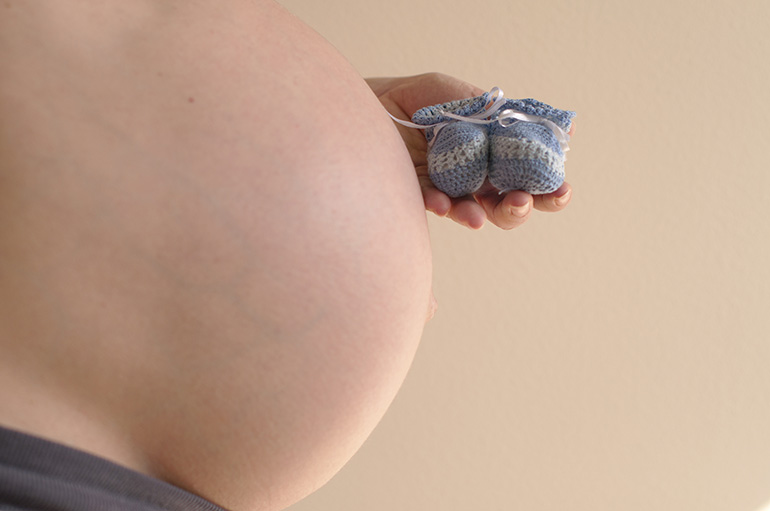
Since I first opened the doors for Prenatal Yoga Center, childbirth education classes have been a staple of our foundation and offerings. For years, thousands of couples have attended these classes in preparation for their upcoming birth.
From time to time, there will be an inquiry as to what the value is of taking a childbirth education class outside the hospital.
For those who are contemplating which class is best for you, here are some points to think about.
5 Reasons To Take Childbirth Class Outside The Hospital
Independent education is not based on policies, but on the best care practice for you.
While the WHO (World Health Organization) supports the practice of intermittent fetal monitoring and studies have shown a lower rate of false-positives and lesser incidence of intervention, many hospitals have installed a policy of full-time fetal monitoring. This policy is more adventitious for the hospital if they face legal issues, not for the mother who many want to decrease her chances of a lower-intervention birth. This is just one of many examples of hospital policy taking priority of best care practices for the mother.
1. Limited Information Due To Hospital Protocols
While for many the idea of a hospital is a place where you go for medical support, a hospital is a business with rules and protocols and the desire to get people in and out as soon as possible. Especially for crowded cosmopolitan hospitals, there is a push to get the mother to clear her labor and delivery room swiftly.
The discussion of labor-inducing drugs or drugs to accelerate labor may not be discussed to their fullest. While the student may learn of their existence, the risks versus the benefits of these interventions may not be allowed to be extensively explored because it may create a backlash by the laboring mother.
Hospital educators may be restricted in what information they are able to give in fear that it may clash with hospital rules and protocols.
2. Learn More Tools And Options For Natural Pain Relief
Since more than 80% of births in the US are medicated, there may not be much time dedicated to discussing natural coping skills. As a birth worker, I make it the main focus to give women a fully stocked toolkit for pain management, even knowing that the majority of women use pain medication.
“Why?”, you may ask. If a woman does not have the skills ready, she will not have confidence her body is capable of moving through labor and the fear of labor could be paralyzing. Also, not everyone gets pain medication when they first desire it. There may be a wait to receive pain relief and is it best for mom and baby that the woman has coping skills.
Approximately 12% of epidurals did not function properly. In those cases, women will need natural pain relief at their ready.
3. Learn To Prepare Your Body For Birth
The idea of physical preparation for labor is relatively new in childbirth education. More traditional curriculums may not take into consideration how the mother’s body and the baby’s position has a direct relationship with the functionality of the birth.
Classes led by certified childbirth educators with additional training as a doula, massage therapist or yoga teacher, brings another aspect to how to help the mother physically and emotionally build stamina and learn to surrender to the labor pains as well as how to create balance in the pelvis and pelvic muscles and ligaments.
When a baby and a mother’s body are well aligned, there is more likelihood for a harmonious birth. Also, childbirth educators who are also doulas can pass along some tricks of the trade since they are attending births on a regular basis.
4. Learn To Navigate The System And Self Advocate
Since the independent childbirth educator does not have to adhere to following a curriculum approved by the hospital, there is more opportunity to learn about the bigger scope of birth, how to work around obstacles, self-advocate for your wishes and you will not hear things like, “this is how we do this” or “we do that only,” You will hear from an independent teacher, “one option may be…” along with the risks versus the benefits of procedures and interventions for making educated, informed decisions.
Part of navigating the system also involves knowing your rights as a patient. It is likely not going to be shared with you, that you have a right to keep your birth as intimate as possible and ask not to have students present at your birth or involved in medical procedures. You may also not learn that you can ask for the attendant to administer an epidural and not the resident.
5. Help See Birth As A Natural Process, Not A Medical Event
Hospitals are a place to go when you are ill or in need of medical attention. So it is no wonder that since birth has moved into the hospital setting in the early 1900’s, that there was a shift in perception of birth from a natural process the body has the capacity to do without much external intervention, to birth being viewed as a medical event that needs constant monitoring and management.
Also, consider the effect of the surroundings on the subconscious for accepting birth as a medical issue if you are actually in the sterile, medical environment learning about birth compared to that of being in an open, spacious “every day” surrounding.
Voices From The Community
I asked the students at PYC why they chose childbirth education classes outside their birthing hospital. Here is what they said:
“I felt at odds with a lot of the things happening in the hospital. And my OB practice turned out to be far more interventionist than I was comfortable with. However, my husband is always on the side of western medicine. So when looking for a childbirth education class, I wanted it to be skewed more on the natural side so he could shift his view towards birth doesn’t necessarily need to be heavily managed.” Second-time mom at PYC- Jessica Kaufman
“I did actually call the hospital to inquire about their birth classes. But they took a really long time to reply. By the time I heard back, I discovered other options. In that time I learned about hypnobirthing. The philosophy and methodology resonated with me.” Second-time mom at PYC – Michal
“I didn’t want to do a childbirth education class that was based on hospital procedures. I wanted the focus of the class to encourage me to be completely in touch with my body during labor and not disconnected and medicated.” First-time mom and PYC teacher- Lynn
“I trusted my yoga center to be aligned with what I wanted to learn versus a more general hospital-based course” First-time mom at PYC- Joy Chang
“The partner focused and natural birth method- the Bradley method, fit with the kind of birth I wanted. At the time, Bradley was not offered at the hospital. I went through my doula who happened to be teaching the class.” – First-time mom at PYC- Kat Shields














